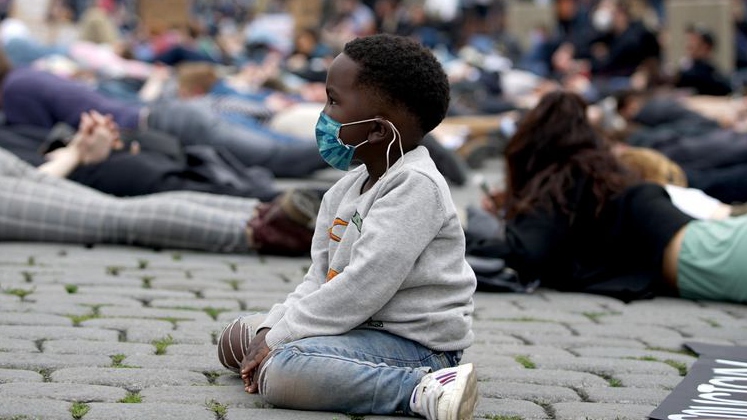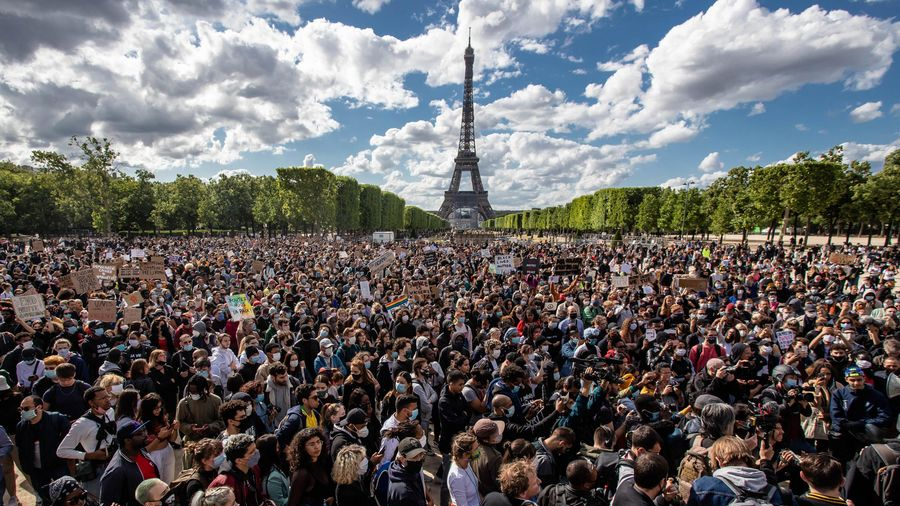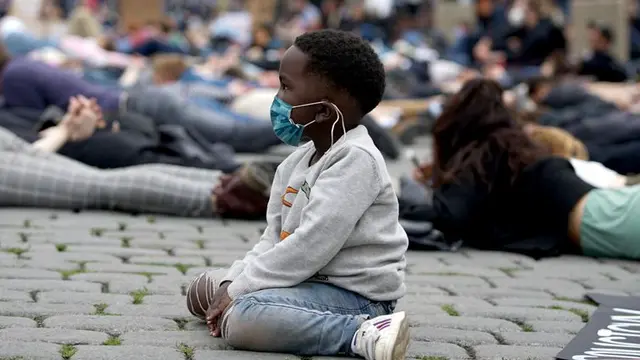
A boy sits during a protest over the death of George Floyd in Prague, Czech Republic, on June 6, 2020. /Xinhua
Editor's note: Xiong Tong is an opinion editor with CGTN Digital. The article reflects the author's opinions and not necessarily the views of CGTN.
"I can't breathe," moaned African-American George Floyd as he slowly suffocated to death, his breath snatched away by the knee of a white policeman. "I can't breathe," protesters chant in his memory in cities across America, and the refrain has begun to echo in parts of Europe among tens of thousands of people.
The phenomenon of Europeans standing firm with the American protesters shows that racial discrimination is not a country's problem, but a global problem.
People across borders felt the brutality of the white police officer. Although the protesters have no weapons, they have their voice, which has begun to resonate with people from all walks of life. The burden on George Floyd was heavy, but the burden of that police officer and the U.S. government will be a lot heavier.
U.S. politicians often criticize other countries about their handling of human rights. The U.S. Department of State has published Country Reports on Human Rights Practices every year since 1976, yet they all lack the country with the most human rights violations of all – the United States itself.
To give advice to others, one needs to first look at themselves. The U.S. has touted itself as being "established upon those principles of freedom, equality, justice, and humanity" in its national creed, and "the land of the free" in its national anthem; yet, the widening social injustice and the deepening racial discrimination in the last decades have shown that these identities do not match the reality.
The recent protests have spread to Britain and France, which indicates the clarion call for equal rights for all regardless of color or creed has awakened humanity in Europe.

People take part in a demonstration to pay tribute to George Floyd in Paris, France, on June 6, 2020. /Xinhua
Europe has its own roots in humanity. It was England's Bill of Rights in 1689 that become the model for America's own Bill of Rights a century later. In France, it was French statesman Maximilien Robespierre's speech in December 1790 that made "Liberty, Equality, Fraternity" its national motto and taught America their meaning by gifting the Statue of Liberty to New York City in 1886.
Wang Yizhou, professor of international politics and China foreign affairs at Peking University, wrote in his book "Creative Involvement: The Evolution of China's Global Role" that "from a global perspective, Europe has always acted in the role of modernization communicator in the past centuries." If America doesn't know how to treat people from all races and ethnicities as equals, it should turn to ask its "modernization communicator" Europe for clues.
Some commentators have compared the recent protests for the rights of African Americans to those of 1960s America. At that time, activists like Martin Luther King Jr. and Malcolm X and American leadership from John F. Kennedy to Lyndon B. Johnson and Richard M. Nixon were all fighting for civil rights, but now it is half a century later, and that leadership has vanished. The U.S. leadership should ask themselves why the country is moving backward.
One of the leading idols in 1960s America was football player Joe DiMaggio. In hard times in the midst of 1968, popular songwriter Paul Simon asked in a line of the song "Mrs. Robinson," "Where have you gone, Joe DiMaggio? A nation turns its lonely eyes to you."
As 2020 ushers in a new decade, protesters from London to Paris should ask the American leadership, "Where have you gone, our friend America? A world has turned its lonely eyes to you."
(If you want to contribute and have specific expertise, please contact us at [email protected].)
 简体中文
简体中文

